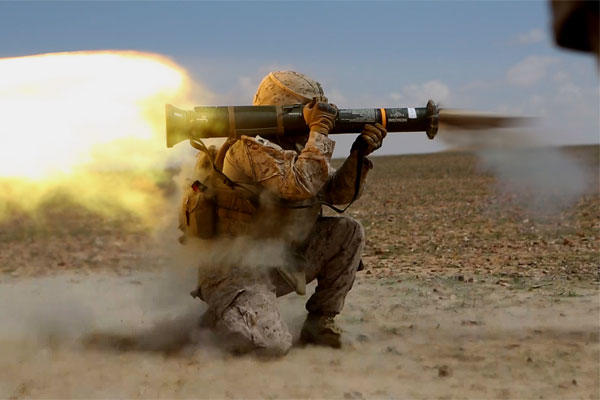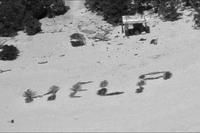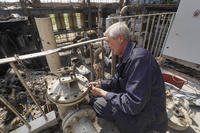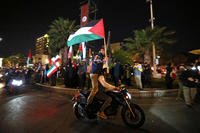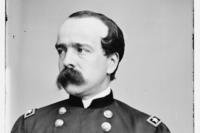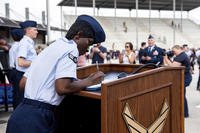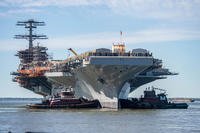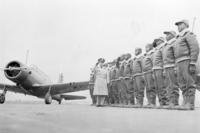As Iraqi security forces waged their successful assault on Islamic State militants in Ramadi late last year, Marines stationed at the nearby Al Taqqadum base were close enough to hear the air assaults and major explosions.
While still not considered "boots on the ground," these Marines, attached to the Corps' crisis response force in the Middle East, supported Iraqi forces behind the scenes in the fight, task force commander Col. Bill McCollough told reporters this week at the Pentagon.
For McCollough's unit, Special-Purpose Marine Air-Ground Crisis Response-Central Command, the December reclamation of Ramadi represented an emotional high point for the six-month deployment rotation, which wrapped up in April.
According to sources and Central Command officials, troops from the task force represent most of the Marine presence in Iraq, with more than 300 Marines each at joint bases in Al Taqaddum and Al Asad, and a company-sized element providing security reinforcement at the U.S. Embassy in Baghdad.
The small Marine team of advisers working directly with Iraqi military leaders at the division level and the larger contingent of troops in Iraq providing security and logistical support to the bases eagerly tracked developments in the fast-paced Ramadi assault.
"We really followed it as a unit through the morning ops intel," McCollough said. "Multiple Marines who were part of the task force have operated on the ground in Ramadi before, so for some it was very poignant. To have gone through with the Iraqi Army at one point losing Ramadi, and you have emotions associated with that, and you have equally good emotions when you see the Iraqi Army take Ramadi back."
For Marines in particular, Ramadi is fraught with significance. The capital of Al Anbar province, it was the site of a key and costly 2006 battle involving thousands of Marines and soldiers. More than 70 Americans were killed in what was then considered the most dangerous place in Iraq.
Legendary Marine general James Mattis, who led the 2003 invasion of Iraq as commander of the 1st Marine division, reportedly stressed the importance of victory there, saying, "Ramadi must hold, [or] the rest of the province goes to hell."
For the Marines who fought in Ramadi and their families, the news that the city had fallen to militants affiliated with the Islamic State in Iraq and Syria, or ISIS, last May was met with sadness and disbelief. But the joy that came with taking back the city wasn't limited to the Marines who had fought there, McCollough said.
"Some young Marines, because we're a young force, weren't involved in taking Ramadi the first time, but I don't think that blunted their pride in saying, what was my contribution to this war, this world. I was a part of a force that had something to do with Ramadi being put back in the hands of the Iraqi government," he said.
Pilots with the task force were kept busy throughout the deployment conducting airstrikes on Islamic State targets. The AV-8B Harrier squadron attached to the unit, VMA-223, flew over 4,100 combat hours and dropped more than 60 pieces of ordnance, and was named the attack squadron of the year by the Marine Corps Association.
"As a Marine, it was always nice to hear Marine pilots coming back and saying, we flew in support of the Ramadi fight today," McCollough said.
The unit also kept MV-22B Ospreys on constant standby for potential tactical recovery of aircraft and personnel missions during the deployment, though they were not ultimately tasked with any aircraft rescues, he said.
McCollough said he couldn't speak about current planning on strategic efforts, such as a stalled offensive to retake Mosul, but said the Iraqi Army had appeared to gain momentum as they saw battlefield successes in Ramadi.
"The Iraqi Army took Ramadi back. They certainly did it with our assistance and our advice, but the Iraqi Army took it back," he said. "They look taller, act taller, we've seen a reversal," he added. Referring to another name for ISIS, he said, "Daesh at one point was ten feet tall; now the Iraqi soldiers are ten feet tall because they've had a victory."
--Hope Hodge Seck can be reached at hope.seck@military.com. Follow her on Twitter at @HopeSeck.
Related Video:
Semper Fi Always Faithful
